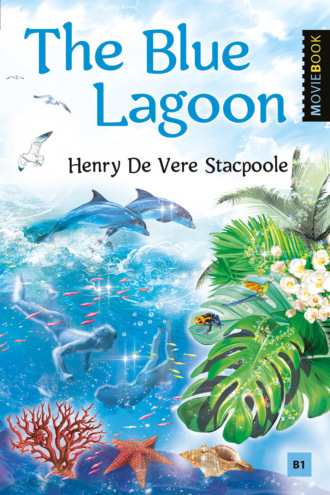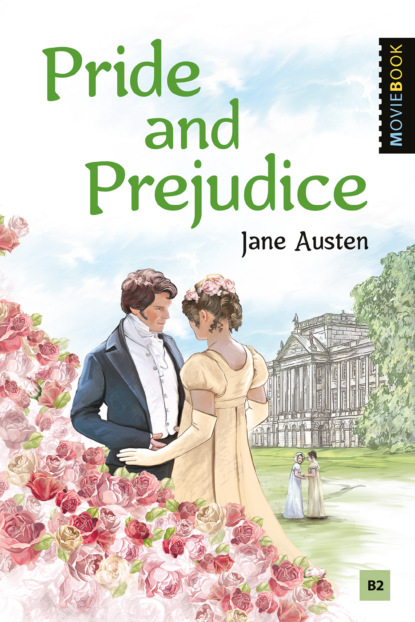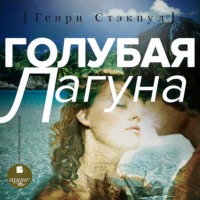
Полная версия
The Blue Lagoon / Голубая лагуна
The trousers were stretched out, examined and approved of, and laid beside the boots.
“Here’s a tiliscope wid wan eye shut,” said Mr Button, examining the broken telescope. “Stick it beside the brogues; it may come in handy[95] for somethin’. Here’s a book”—giving the nautical almanac to the boy. “Tell me what it says.”
Dick examined the pages of figures hopelessly.
“I can’t read ’em,” said Dick; “it’s numbers.”
“Toss it overboard,” said Mr Button.
Dick did what he was told joyfully.
Paddy tried on the tall hat, and the children laughed. On her old friend’s head the thing didn’t have terror for Emmeline.
She had two methods of laughing. The angelic smile—a rare thing—and, almost as rare, a laugh in which she showed her little white teeth, whilst she pressed her hands together.
Paddy put the hat on one side, and continued the sorting, searching all the pockets of the clothes and finding nothing. When he had arranged what to keep, they tossed the rest overboard, and the valuables were taken to the captain’s cabin, there to remain till wanted.
Then the idea that food might be useful as well as old clothes in their present condition struck the mind[96] of Mr Button, and he began to search, though couldn’t find anything else.
Still, the provisions and water brought on board from the dinghy would be sufficient to last them some ten days or so, and in the course of ten days a lot of things might happen.
Mr Button leaned over the side. The dinghy was nestling beside the brig like a duckling beside a duck. Having made all secure, he climbed slowly up to the top, and looked round upon the sea.
Chapter VIII
Shadows in the Moonlight
“Daddy’s a long time coming,” said Dick all of a sudden.
They were seated on the deck of the brig. The sun was setting in a sea that seemed like a sea of boiling gold. Some mystery of mirage caused the water to tremble.
“Ay, is he,” said Mr Button; “but it’s better late than never. Now don’t be thinkin’ of him, for that won’t bring him. Look at the sun goin’ into the wather, and don’t be spakin’ a word, now, but listen and you’ll hear it hiss.”
The children gazed and listened, Paddy also. All three were silent.
You could hear the water hiss—if you had imagination enough. Once having touched the water, the sun went down behind it, as swiftly as a man in a hurry going down a ladder. As the sun vanished, a ghostly and golden twilight spread over the sea. Then the sea became a violet shadow, the west darkened, and the stars rushed over the sky.
“Mr Button,” said Emmeline, nodding towards the sun as he vanished, “where’s over there?”
“The west,” replied he, staring at the sunset. “Chainy and Injee[97] and all away beyant.”
“Where’s the sun gone to now, Paddy?” asked Dick.
“He’s gone chasin’ the moon, an’ she’s running off for all she’s worth[98]; she’ll be up in a minit. He’s always afther her, but he’s never caught her yet.”
The moon, silver and splendid, was breaking from the water. She was full, and her light was powerful almost as the light of day. The shadows of the children and the shadow of Mr Button were cast on the wall of the caboose hard and black as silhouettes.
“Look at our shadows!” cried Dick, taking off his straw hat and waving it.
Emmeline held up her doll to see its shadow, and Mr Button held up his pipe.
“Come now,” said he, putting the pipe back in his mouth, and making to rise, “and be off to bed; it’s time you were aslape, the both of you.”
Dick began to wail.
“I don’t want to go to bed; I aint tired, Paddy—les’s stay a little longer.”
“Not a minit,” said the other, with all the decision of a nurse; “not a minit afther me pipe’s out!”
“Fill it again,” said Dick.
Mr Button made no reply.
“Mr Button!” said Emmeline. She was holding her nose in the air and sniffing; her delicate sense of smell felt something lost to the others.
“What is it, acushla[99]?”
“I smell something.”
“What d’ye say you smell?”
“Something nice.”
“What’s it like?” asked Dick, snifnif g hard. “I don’t smell anything.”
Emmeline sniffed again to make sure.
“Flowers,” said she.
The breeze was bearing with it a faint, faint odour: a perfume of vanilla and spice so faint as to be insensible to almost all.
“Flowers!” said the old sailor, tapping the ashes out of his pipe against the heel of his boot. “And where’d you get flowers in middle of the say? It’s dhramin’ you are. Come now—to bed wid yiz!”
“Fill it again,” wailed Dick, referring to the pipe.
“It’s a spankin’ I’ll give you,” replied his guardian, lifting him from the deck, and then assisting Emmeline, “in two ticks[100] if you don’t behave. Come along, Em’line.”
He started off, a small hand in each of his, Dick bellowing.
As they passed the ship’s bell, Dick stretched towards the pin that was still lying on the deck, seized it, and hit the bell a mighty bang. It was the last pleasure to be had before sleep, and he got it.
Paddy had made up beds for himself and his charges in the deck-house; he had cleared the stuff off the table, opened the windows to get the musty smell away, and placed the mattresses from the captain and mate’s cabins on the floor.
When the children were in bed and asleep, he went to the starboard rail, and, leaning on it, looked over the moonlit sea. He was thinking of ships as his eye wandered over the sea, little dreaming of the message that had been received and dimly understood by Emmeline. Then he leaned with his back to the rail and his hands in his pockets. He was not thinking now, he was meditating.
The basis of the Irish character, Paddy Button being an example, is a deep laziness mixed with a deep melancholy. Yet Paddy, in his left-handed way, was as hard a worker as any man on board ship; and as for melancholy, he was the life and soul of the cockpit[101].
Suddenly Mr Button came back from his dreams to find himself on the deck of the Shenandoah; and he instantly became taken by fears. Beyond the white deserted deck, he could see the door of the caboose. Suppose he should suddenly see a head pop out—or, worse, a shadowy form go in?
He turned to the deck-house, where the children were sound asleep[102], and where, in a few minutes, he, too, was sound asleep beside them, while all night long the brig rocked to the gentle ripple of the Pacific, and the breeze blew, bringing with it the perfume of flowers.
Chapter IX
The Tragedy of the Boats
When the fog lifted after midnight the people in the long-boat saw the quarter-boat half a mile to starboard of them.
“Can you see the dinghy?” asked Lestrange of the captain, who was standing up searching the horizon.
“Not a speck,[103]” answered Le Farge. “Damn that Irishman! but for him I’d have got the boats away properly supplied and all[104]; as I don’t know what we’ve got aboard. You, Jenkins, what have you got there?”
“Two bags of bread and a small barrel of water,” answered the steward.
“A barrel of water, half full!” came another voice.
Then the steward’s voice: “So it is; there’s not more than a couple of gallons[105] in her.”
“My God!” said Le Farge. “Damn that Irishman!”
“There’s not more than’ll give us two half pannikins apiece all round,” said the steward.
“Maybe,” said Le Farge, “the quarter-boat’s better stocked; pull for her[106].”
“She’s pulling for us,” said the stroke oar[107].
“Captain,” asked Lestrange, “are you sure there’s no sight of the dinghy?”
“None,” replied Le Farge.
The unfortunate man’s head sank on his breast. He had little time to think over his troubles, however, for a tragedy was beginning to start around him, the most shocking, perhaps, in the history of the sea.
When the boats were within hearing distance, a man in the bow of the long-boat rose up.
“Quarter-boat ahoy!”
“Ahoy!”
“How much water have you?”
“None!”
The word came floating over the moonlit water. At it the fellows in the long-boat ceased rowing, and you could see the water-drops dripping off their oars like diamonds in the moonlight.
“Quarter-boat ahoy!” shouted the fellow in the bow. “Lay on your oars.”
“Here, you scowbanker[108]!” cried Le Farge, “who are you to be giving directions—”
“Scowbanker yourself!” replied the fellow. “Bullies, put her about[109]!”
The starboard oars backed water, and the boat came round.
By chance the worst lot of the Northumberland’s crew were in the long-boat—real “scowbankers,” scum; and how scum clings to life you will never know, until you have been amongst it in an open boat at sea. Le Farge had no more command over this lot than you have who are reading this book.
“Heave to[110]!” came from the quarter-boat, as she laboured behind.
“Lay on your oars, bullies!” cried the rufaif n at the bow, who was still standing up like an evil genius[111] who had taken momentary command over events. “Lay on your oars, bullies; they’d better have it now.”
The quarter-boat in her turn ceased rowing, and lay a cable’s length away.
“How much water have you?” came the mate’s voice.
“Not enough to go round.”
Le Farge made to rise, and the stroke oar struck at him, catching him in the wind and doubling him up in the bottom of the boat.
“Give us some, for God’s sake!” came the mate’s voice; “we’re parched with rowing, and there’s a woman on board.”
The fellow in the bow of the long-boat broke into blasphemy[112].
“Give us some,” came the mate’s voice, “or, by God, we’ll lay you aboard[113]!”
Before the words were well spoken the men in the quarter-boat carried the threat into action. The conflict was brief: the quarter-boat was too crowded for fighting. The starboard men in the long-boat fought with their oars, while the fellows to port steadied the boat[114].
The fight did not last long, and presently the quarter-boat went away, half of the men in her cut about the head and bleeding—two of them senseless.
It was sundown on the following day. The long-boat lay adrift. The last drop of water had been served out eight hours before.
The quarter-boat had been pursuing her all day, begging for water when there was none.
The men in the long-boat, gloomy and morose, tortured by thirst, and tormented by the voices imploring for water, lay on their oars when the other boat tried to approach.
Now and then, suddenly, and as if moved by a common impulse, they would all shout out together: “We have none.” But the quarter-boat would not believe. It was in vain[115] to hold the open barrel upside down to prove its dryness, the half-delirious creatures had it fixed in their minds that their comrades were hiding from them the water that was not.
Just as the sun touched the sea, Lestrange raised himself and looked over the side. He saw the quarter-boat drifting a cable’s length away, lit by the full light of sunset, and the ghosts in it, seeing him, held out in silent appeal their blackened tongues.
Of the night that followed it is almost impsible to speak. Thirst was nothing to what the scowbankers suffered from the torture of the appeal for water that came to them at intervals during the night.
When at last the Arago, a French whale ship, saw them, the crew of the long-boat were still alive, but three of them were raving madmen[116]. Of the crew of the quarter-boat was saved—not one.
Part II
Chapter X
The Island
“Childer!” shouted Paddy, while the children standing beneath on deck were craning their faces up to him. “There’s an island in front of us.”
“Hurrah!” cried Dick. He was not quite sure what an island might be like, but it was something fresh, and Paddy’s voice was jubilant.
“Land ho! it is,” said he, coming down to the deck. “Come forward to the bows, and I’ll show it you.”
He stood on the timber in the bows and lifted Emmeline up in his arms, so she could see something of an unclear colour on the horizon.
It was not directly ahead, but to the right. When Dick had looked and expressed his disappointment as there was very little to see, Paddy began to make preparations for leaving the ship.
It was only just now, with land in sight, that he recognised the horror of the position from which they were about to escape.
He fed the children hurriedly with some biscuits and tinned meat, and then, with a biscuit in his hand, eating as he went, he went about the decks, collecting things and placing them in the dinghy. All the old clothes, a housewife full of needles and thread, such as seamen sometimes carry, the half-sack of potatoes, a saw which he found in the caboose, the precious coil of tobacco, and a lot of other odds and ends[117] he transhipped, sinking the little dinghy several inches in the process. Also, of course, he took the breaker of water, and the remains of the biscuit and tinned stuff they had brought on board. When this was done, and the dinghy ready, he went forward with the children to the bow, to see how the island was showing.
It had loomed up nearer during the hour or so in which he had been collecting and storing the things—nearer, and more to the right, which meant that the brig was carried by a fast current, and that she would pass it, leaving it two or three miles to starboard. It was well they had the dinghy.
Конец ознакомительного фрагмента.
Текст предоставлен ООО «Литрес».
Прочитайте эту книгу целиком, купив полную легальную версию на Литрес.
Безопасно оплатить книгу можно банковской картой Visa, MasterCard, Maestro, со счета мобильного телефона, с платежного терминала, в салоне МТС или Связной, через PayPal, WebMoney, Яндекс.Деньги, QIWI Кошелек, бонусными картами или другим удобным Вам способом.
Примечания
1
масляная лампа
2
The Shan Van Vocht (The Poor Old Woman) – песня времён Ирландского восстания 1798 г.
3
кельт, ирландец
4
Коннаут – провинция на западе Ирландии.
5
У него была крепкая кельтская закалка
6
Название корабля и северо-восточное графство Англии.
7
Огайо – американский штат.
8
Мыс Горн – южная оконечность Африки.
9
Направляясь из Нового Орлеана в Сан-Франциско
10
и вытер лоб правым рукавом
11
Лепрекон – гном, персонаж ирландского фольклора; обычно изображается одетым во всё зелёное.
12
и никто не знал, что он ещё затеет
13
seaman at sea – моряку в море
14
Думаю, владелец ближайшего салуна не упустит случая выпотрошить тебя до последнего гроша
15
Будь проклят
16
Легко, чёрт возьми, говорить
17
ты надираешься как свинья
18
самогон тебя погубит
19
Млечный Путь – галактика.
20
Южный Крест – созвездие южного полушария.
21
У него явно была чахотка
22
левый борт судна
23
усаживалась за сложенными канатами
24
туда-сюда
25
когда они добирались до мистера Баттона, их было от него не оторвать
26
с любовью (итал.)
27
чернильное пятно
28
какого бы возраста он ни был
29
бог знает куда
30
latitudes (искаж.)
31
и вы будете в полном порядке
32
Золотые Ворота – мост в Сан-Франциско.
33
неудивительно, что я скрываю само это слово от тех, кого люблю
34
Дики будет обеспеченным
35
плыла по течению
36
кают-компания
37
сходной трап
38
Эй, там, внизу!
39
грот-мачта
40
Он слышал пронзительный свисток боцмана.
41
баркас, шлюпка
42
затопить трюм
43
он бросился к сходному трапу
44
и жилы выступали на висках, как скрученные канаты
45
Забирайтесь в шлюпку
46
Спускайте!
47
Как только он взялся за вёсла
48
Спасайся кто может! Я вспомнил: в трюме две бочки пороха!
49
туман над морем
50
Всё, я выдохся!
51
на четвереньках
52
мандарин
53
Баркас был далеко впереди
54
Эй, на шлюпке!
55
Швартуйтесь сюда!
56
сушил вёсла
57
Лево руля!
58
правый борт судна
59
который подхватывал морские термины
60
глухой как пень
61
Она уснула
62
уключины
63
Лье – старинная мера длины, равная трём милям.
64
я чуть коньки не отбросил
65
соломенная шляпа
66
easy does it – это проще простого
67
your honour – ваша честь
68
barrel
69
называл вещи своими именами
70
ставить крошечную мачту
71
против ветра
72
Я пойду с попутным ветром, и будь что будет.
73
Он поставил парус
74
повернул руль
75
тряпичная кукла
76
To ease my troubles
77
он был в своей стихии
78
Альбакор – длиннопёрый тунец.
79
тары-бары
80
то и дело
81
довольно много
82
беззаботная жизнь
83
брошена на произвол судьбы
84
Кабельтов – десятая часть морской мили, примерно 200 метров.
85
Шенандоа – национальный парк штата Виргиния.
86
Вот те на!
87
у детей от чтения глаза на лоб лезут
88
а они ничего не понимают
89
да пропади это чтение пропадом
90
пришвартовал лодку
91
Рубка – салон на верхней палубе.
92
морской волк
93
табак, свёрнутый трубочкой
94
У него странный запах
95
он может пригодиться
96
пришла в голову
97
China and India
98
что есть мочи
99
дорогуша (ирл.)
100
в два счёта
101
он был душой компании
102
крепко спали
103
Никакого намёка
104
если бы не он, я бы снарядил лодки как надо
105
Галлон – мера объёма, около четырёх литров.
106
гребите к ней
107
гребец
108
прохвост (сленг.)
109
разверните лодку
110
Ложись в дрейф!
111
злой гений
112
разразился бранью
113
подойдём вплотную
114
парни на левом борту держали равновесие
115
Было бесполезно
116
были буйнопомешанными
117
всякая всячина





